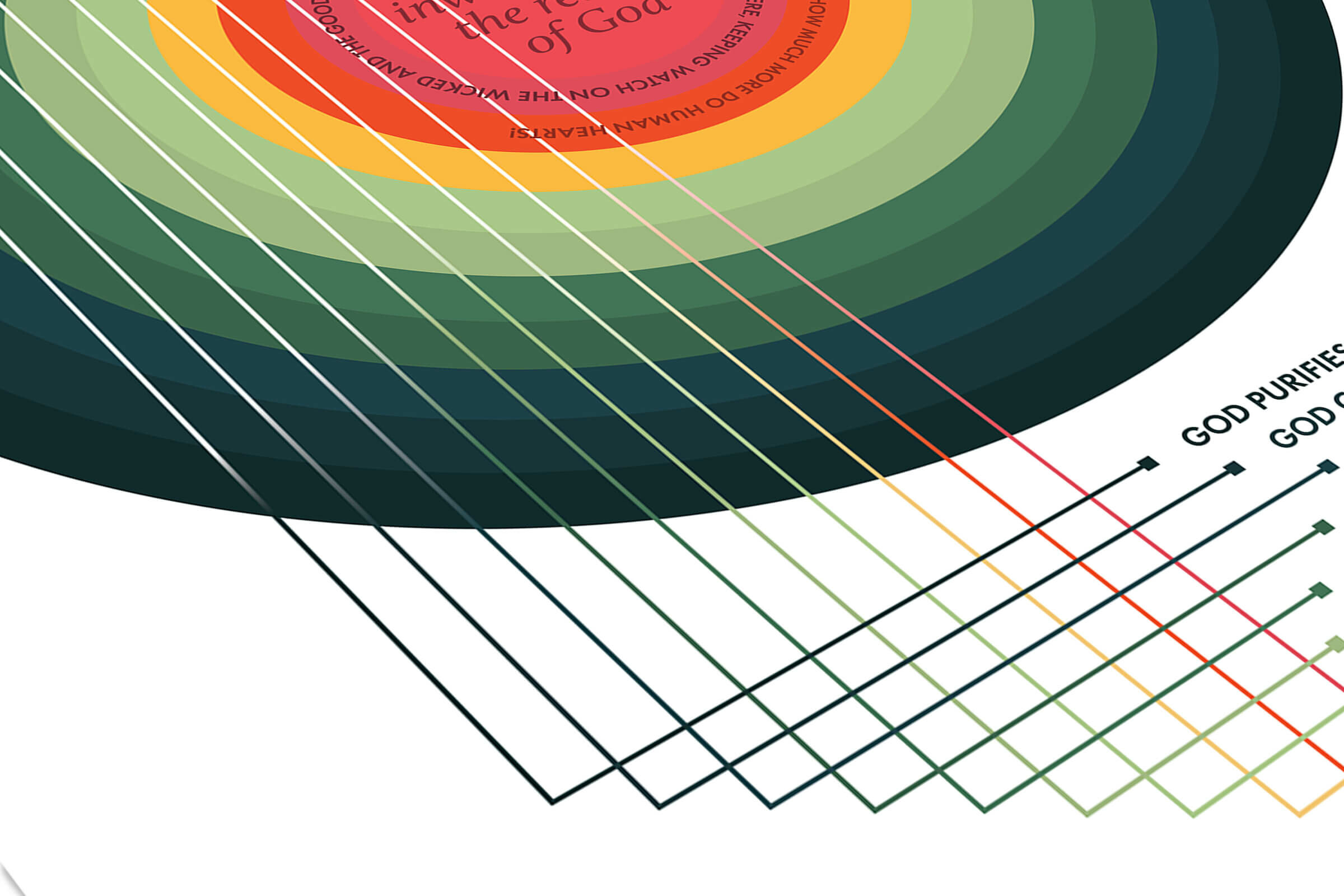The book of Proverbs provides unique insight into God’s character.
While the Psalms “begin with the blessed person who delights in the law of the Lord, the Proverbs begin with the wise person who walks in the fear of the Lord.” 2 Both teach us about God. Both show us what he is like; they simply do so from different perspectives. “While the songs allow us to look upward to God from the reality of life, the books of wisdom allow us to look inward to our lives from the reality of God.” 3
Additionally, the book of Proverbs was written to give “prudence to the simple, knowledge and discretion to the young (Proverbs 1:4) and to make the wise even wiser (Proverbs 1:5).” The author does this by showing the reader what God is like. The book is written from a father’s perspective to his son; we see a father’s heart for his son. And as we follow this father’s wise instruction, we begin to understand the heart of our Heavenly Father better.
Collectively we are shown what God treasures and where his heart is. It is an inward look from the reality of God.
Below are ten unique ways we see the heart of God. By studying the book of Proverbs, we see how God interacts with us and how we are to reflect him in the world. 4

"How you think about God will radically shape how you live your life every day."
What Is God Like? The Heart of God in Proverbs.
1. God purifies and tests the hearts of people (Proverbs 17:3)
Proverbs says, “The crucible is for silver, and the furnace is for gold, and the Lord tests hearts (Proverbs 17:3).” Few people enjoy tests. They are long, tiring, and often uncomfortable. Throughout the Bible, we see that God knows the desires of our hearts (more on that in a moment); he is intimately aware of our hearts. In these verses, we see that God’s purpose in testing our hearts is not to make us uncomfortable but to bring about purity in our lives. When gold is refined by fire, it causes the impurities to be exposed and then removed. Similarly, God’s desire in testing our hearts is to expose the impurities. In love, he refines our hearts to become more and more like his.
2. God cares for the poor and needy (Proverbs 22:22)
One of the world’s most beautiful realities is that God cares for the poor and needy. He is transcendent, beyond anything you or I could ever imagine. God is not merely the greatest being we can imagine infinitely bettered. He is utterly different than us, yet he cares for us deeply. He is transcendent yet profoundly imminent. In the gospels, we see God’s care over even the sparrows. In the books of Proverbs, we read, “Do not rob the poor, because he is poor, or crush the afflicted at the gate (Proverbs 22:22).” There is something about the heart of God that moves towards those in need. He cares deeply for the underprivileged, undervalued, and vulnerable in the world. God loves those who are poor and needy.
3. God loves those who love righteousness (Proverbs 15:9)
Not only does God love those who are poor and needy, but he also loves those who love righteousness. Proverbs says, “The way of the wicked is an abomination to the Lord, but he loves him who pursues righteousness (Proverbs 15:9).” You may never be noticed for pursuing righteousness; sometimes, it may cost you. But know that God sees and loves those who seek what is right. His heart loves those who love righteousness.
4. God loves to listen to our prayers (Proverbs 15:8)
I once heard a person say, “The only one who dares wake up a king at 3:00 AM for a glass of water is a child. We have that kind of access.” Through prayer, we can speak, at any moment, with the king of the universe. Understand that we are not simply permitted to talk to him as if he merely allows it. We are welcomed, invited, and encouraged to bring our prayers to God. The heart of God is that he delights in hearing the heart of his children. In the Psalms, we learn how to pray broken, ugly, glad, worshipful, sad, and overwhelmed prayers — the psalmist models it for us beautifully. In Proverbs, however, we learn God’s heart is towards those who pray. “The sacrifice of the wicked is an abomination to the Lord, but the prayer of the upright is acceptable to him (Proverbs 15:8).” God is not burdened by the same things as you and me. He wants to hear from you today. So bring your prayers to him. No one will get famous in the prayer closet. But they will get God, and that is far better.
5. God will judge the wicked (Proverbs 11:31)
Sometimes we don’t like to talk about God as a judge. We love that God hears our prayers, forgives us despite our sins, and moves toward those who are poor and needy. But to talk about God as a judge seems harsh and condemning. Yet throughout the book of Proverbs, we see that one day God will judge the wicked. Proverbs 11:31 says, “If the righteous is repaid on earth, how much more the wicked and the sinner!” We must push against our tendency to imagine God in our image rather than allowing Scripture to inform us of what God is like. He is a God of compassion and love. And at the very same time, he is a God who hates sin and will judge wickedness. We embrace this tension; we don’t resolve it.
I could say much more, but let me share a brief thought with you that’s helpful when thinking about judgment. Though it can seem complicated to talk about God as a judge, it’s important to remember that you and I would never want to serve a God who turns a blind eye to evil — that’s not a good God. Instead, you want a God who moves towards evil and brings peace and justice where evil and brokenness once reigned. That is the God we worship. He does not stand far away from messy things. He doesn’t merely judge wickedness but bore the weight of iniquity so that sinners could go free. The cross is where God’s perfect love collides with his perfect justice. There is not a place in all of history to see his glory more clearly.
6. God rescues those in trouble (Proverbs 11:8)
When you are in trouble, where do you look for rescue? Who do you call when things are falling apart? I hope you turn to trusted friends, family, and church members — people who can walk with you during dark days. But I also hope you never forget to turn to the Lord. Proverbs says, “The righteous is delivered from trouble, and the wicked walks into it instead (Proverbs 11:8).” The Psalms teach us that God is a present help in trouble (Psalm 46:1). And here in Proverbs, we see that God rescues us from trouble.
7. God is a tower of safety (Proverbs 18:10)
God not only rescues those in trouble, but we also see in Proverbs that he is a tower of safety. “The name of the Lord is a fortified tower; the righteous run to it and are safe (Proverbs 18:10).” You and I could turn to many places in times of trouble: relationships, work ethic, or money. But what we see in Proverbs is that the safest place you can run in times of trouble is to the Lord. He is a place of safety in a world full of danger. His heart is kind, and he desires to protect those who seek refuge in him.
8. God is sovereign over all things (Proverbs 16:33)
Throughout the books of Proverbs, we see time and time again that God is sovereign over all things. His providence invades every part of our world. His involvement in nature is not distant; it’s hands-on. Proverbs says, “The lot is cast into the lap, but its every decision is from the Lord (Proverbs 16:33).” Elsewhere we read, “The king’s heart is in the hand of the LORD, like the rivers of water; He turns it wherever He wishes (Proverbs 21:1).” In other words, there are never moments of trepidation in heaven. God is in control. God is sovereign. After all, if God is not sovereign, God is not God. He is over everything; his providence directs all created things towards his perfect will, for his glory and your good.
9. God knows the hearts of all people (Proverbs 15:11)
Not only is God completely sovereign over all things, but he is also profoundly aware of all people’s hearts. He knows your deepest longing, greatest sadness, and most profound joys. He knows the secret thoughts you’ve carried this week and the unexplored emotions you’ve held your whole life. There is no part of you that God doesn’t know. There is no room in your heart that God has not explored. Proverbs says, “Sheol and Abaddon lie open before the Lord; how much more the hearts of the children of man (Proverbs 15:11)!” For some, this is the most fantastic news you’ve ever heard; for others, it is a terrifying prospect. But let me encourage you with this thought. There is no greater joy in the world than being fully known and loved. Having one without the other is painful, but having both is pure joy. This is the heart of God — he fully knows you (every part of you) and yet moves towards you in love.
10. God is aware of all that happens (Proverbs 15:3)
In his book Knowledge of the Holy, A.W. Tozer said this about God: “I can inform Thee of nothing, and it is vain to try and hide anything from Thee.” 5 Proverbs says it this way, “The eyes of the Lord are in every place, keeping watch on the evil and the good (Proverbs 15:3).” In other words, there is no place on earth that is beyond the reach of God’s awareness. He created it all and is aware of it all. From the largest galaxy to the smallest atom, God sees and knows all things. No matter who you are, no matter how insignificant you feel, you can be confident of this: you are seen and known by the King and Creator of the universe.
The Greatest Gift A Father Can Give.
In the book of Proverbs, we see a father who knew the greatest gift he could give his son was a clear conception of God. One author said, “We do the greatest service to the next generation of Christians by passing on to them undimmed and undiminished that noble concept of God.” 6 May God use this book of wisdom to give you a clearer understanding of who he is and enable you to walk in wisdom this week.
- Knowledge of the Holy, pg. 1 (back)
- A Visual Theology Guide to the Bible, pg. 152 (back)
- A Visual Theology Guide to the Bible, pg. 152 (back)
- The following bullet points are expanded from page 153 of A Visual Theology Guide to the Bible (back)
- Knowledge of the Holy, pg. 55 (back)
- Knowledge of the Holy, pg. 4 (back)







